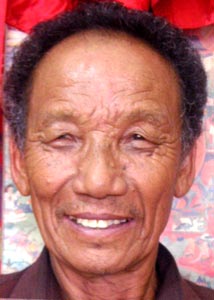Name: Pema Wangdu
(Alias: No)
Gender: Male
Interview Age: 77
Date of Birth: 1932
Birthplace: Powo Yong, Kham, Tibet
Year Left Tibet: 1959
Profession: Agriculture, Dairy Farming
Monk/Nun: No
Political Prisoner: No

Interview No.: 64
Date: 2007-07-03
Language: Tibetan
Location: Lugsung Samdupling Settlement, Bylakuppe, Karnataka, India
Categories: Culture and History
Keywords: Chinese rule -- life under, clothing/weaving, customs/traditions, death/burial customs, escape experiences, herding, Kham, marriage practices, myths/stories
Summary:
Pema Wangdu is from Powo in eastern Tibet. He gives a detailed account of how Powo was an independent state since the time of the Chogyal 'religious kings.' Pema Wangdu explains that these historical chronicles are handed down by oral transmission from generation to generation.
Pema Wangdu recounts details about how people in his region raised their livestock for special breeds with unique feature. He explains how the animals were named and how they grazed on their own and returned home to be milked. Traditional natural methods such as bled-letting were used for treating diseases in animals. He also describes the marriage customs in Powo, which involved many community members and elaborate rituals. Pema Wangdu explains traditional clothing, weapons, and funerals.
Pema Wangdu fled Tibet with his family after the Chinese began to inflict hardships on the Tibetans. During their escape, Chinese soldiers killed some of the people in his group, including his wife, leaving Pema Wangdu to care for his 7-month-old son. He arrived in India in 1960 and married a woman from his village who had also fled from Tibet and helped him care for his son.
Interview Team:
- Rebecca Novick (Interviewer)
- Ronny Novick (Videographer)
- Tsering Dorjee (Interpreter)

